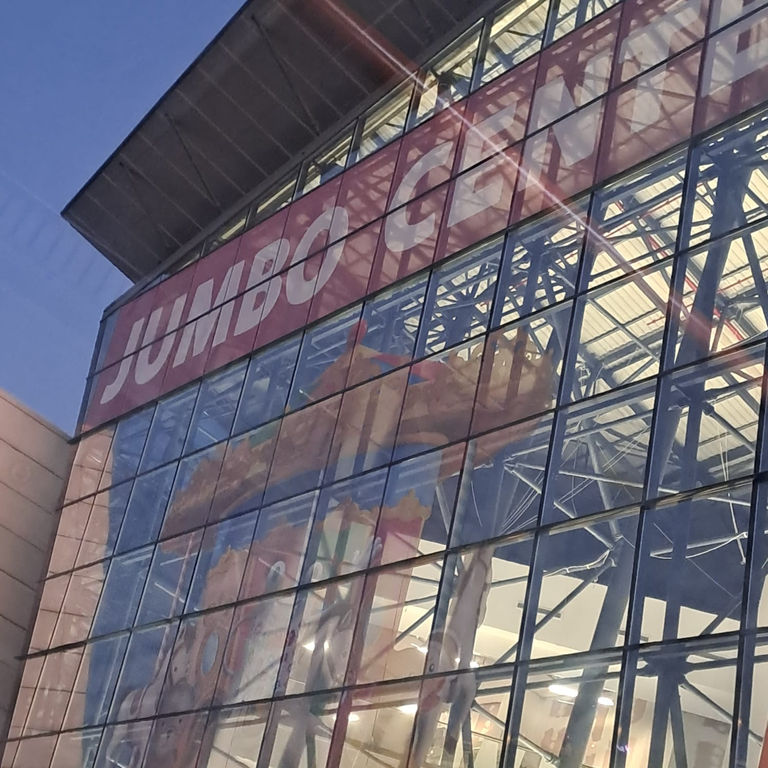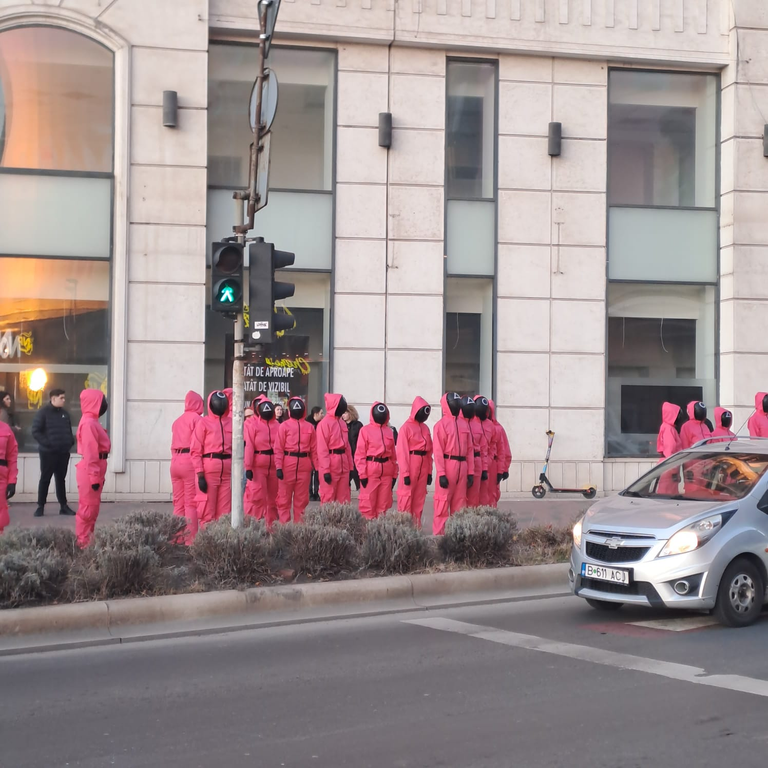I'm taking an economics course over on PA, taught by Gale Pooley and Marian Tupy, authors of "Superabundance: The Story of Population Growth, Innovation, and Human Flourishing on an Infinitely Bountiful Planet". It's a hopeful, optimism-inducing course that seeks to emphasize that despite population growth alarmism, we are doing well, we are resourceful, and limiting reproduction is not the solution to our societal woes.
So far, so good, as far as I'm concerned, though as I progress, I find the course is somewhat biased. In comparing prices and resource abundance between, say, 1900 and 2022, it fails to take into account one major element of our modern-day cost of living:
Our society features a much higher incentive to spend than it did 100-150 years ago.

As the name suggests, this nearby shopping center has every needless, stupid thing you couldn't possibly need, yet is designed in such a winding, labyrinthic way that you'll end up buying a cart or two, anyway. Plus, it's cheap, which makes you forget how low the quality is.
Being as we are surrounded by stores and shopping malls has not been enough, and we are now bombarded by opportunities to spend money from the comfort of our own beds/toilet seats. Young people in my circle seem to be constantly going out to pick up delivery packages, and even the ones who are mindful of their budgets seem to constantly be shopping either the second-hand online resellers, or relatively low-price, low-quality outlets.
I'm sure the teachers of my course have their numbers right, but what they're failing to factor in is... we feel worthless if we're not constantly justifying our existence through needless spending. A top here, an appliance there - we're being tricked into believing that in order to be truly happy, you need to be constantly swiping your credit card, and while that's obviously untrue, it's a little trickier conceptualizing and embodying that knowledge.
Why? Because while we could be living highly abundant, fruitful lives based on the rise of wages/prices ratio, modern social mentality does tell us that we're living a life of privation.
In reality, it is a life of deprivation, as deprivation refers to the absence of something one desires, as opposed to something essential one actually needs (privation), but modern-day marketing has got us in such a death-grip that we fail to distinguish one from the other.
We've become convinced our lives are so devoid of meaning unless we're constantly buying shit, that cutting down our spending is a life of privation - it robs us not of the shit we buy (inessential and largely superfluous), but of the meaning we ascribe it (essential).

I believe these guys have been criticizing capitalism a fair bit. They're looking up at one of the most central and oldest shopping centers here in Bucharest, by the way.
Young people are highly motivated to spend exorbitant amounts of money because of an an inanely human need - the need to hold meaning, to matter in this world.
Arguably, of course, not all modern spending is meaningless. Technology, for instance, is advancing at an unparalleled rate which justifies spending more to keep up. You need to. But other areas of life that a lot of people are spending a fuckton on isn't advancing at the same rate. It's not a matter of it costs more/less than it did 30-50 years ago", but of us buying more than we truly need just to feel something.
So then, why is it so hard to stop?
Because my life lacks a fundamental sense of worthiness if I'm not constantly providing my home or my family or my self with new apparel. Okay. So then, a better question would be,
Why is it so hard to find meaning in modern times?
The decline of religious practice could be one answer. A growing sense of peer isolation could well be another. The threat of replacement by soulless machinery, yet another. The trouble is, when you throw such hefty concepts at a young person's head, no wonder they run for the nearest mall entrance. How am I, or any of my peers, expected to fix any of the above terrible prospects? And how do I find meaning, unable to fix any of these?
This drought of purpose might account for a modern-day resurge in religious practice that we're seeing in the West. Of the three reasons above, the religious one at least poses a viable, tangible answer - go to church. But that is certainly not for all, and it's worth remembering organized religion has been part of our lifestyle for centuries... and we've still ended up here.
So then, how do we find alternative sources of meaning (alternative to soulless, needless shit we seem to be buying obsessively)?
I wish this post ended in an answer, but it ends in an open question. How do you? (and if your answer is religious practice, kudos to you, I'm not knocking it, just don't think it's viable for everyone).
In a world where so many available and continuous voices tell me that to buy is to hold value, how do I wean myself off such a teaching, and what do I replace it with?
Personally, I've found a great degree of value in the pursuit of my writing. I tend to invest in things that are necessary to me or my well-being or that foster or enrich my writing. And to me, being able to live and practice this thing I love does provide meaning, enough to not only justify not buying shit-ton of clothes I don't need or the latest iPhone, but to not make me feel like I'm deprived of those things.
It's the best answer I can come up with, on a personal level. Of course, love and connection are also a valuable answer, and I suspect that answer will have more weight once I've had children, but until then, I am still at an age where it's hard to see sometimes how having a swell friendship or great love for so-and-so ties into my buying this cutesy pair of jeans.
What do you find meaning in? Is it, perhaps, stuff you don't really think you need but buy anyway? There's no shame in it. Actually there is, but maybe by talking about it, we can change how we go about things. I feel like shit when I buy stuff I don't need, too. We all do. I think that's the problem, really.

When happiness depends upon anything external it's impossible to make that feeling of fulfillment last. The corporations and the media have brainwashed us on so many levels to go through these short cycles of dopamine hits/crashes when we make purchases. I think there are physical things that can enhance your life like a piece of workout equipment, a computer, a bike, or a book, but they don't provide lasting meaning on their own. On the flip-side, experiences very much can provide lasting meaning -- a trip (as I'm sure you know), deep work, planting a garden, an afternoon hang with a good friend, volunteering your time, etc.
The minimalism movement gives me hope that people are waking up and starting to rebel against the madness. For better or worse, I believe we're in the late-stage capitalism (as we know it) phase now. AI, robotics, and quantum computing are going to bring about a whole new world -- life and the global economy will be restructured into some kind of hybrid of how most of us live today. Free markets will probably survive but will be different. As with every change there will be pros and cons but one of the pros will be less of a focus on consumption. It's going to be wild and we're going to have a front row seat.
Your comment is upvoted by @topcomment
More info - Support @topcomment - Discord
I agree, the commercial world is designed to take us by the hand and fill us with unnecessary things, and if we do not stop to think about it for a moment, we can easily be fooled and live full of things but empty.
I feel that with the passage of time we have been conditioned, until reaching our generation which sadly is forced to seek immediate pleasures wherever, including having possessions and the one who is aware of all this sometimes suffers a little more, but it is also the one who from that suffering learns to deal with all this.
Dedicating myself to grow as a person, being aware of the spiritual need and despite what everyone else does, having a balanced life in which I give priority to that which is not achieved with money, has helped me.
I really liked your post full of honesty.
Your comment is upvoted by @topcomment
More info - Support @topcomment - Discord
Few years ago I spend a lot of money on a giant puzzle. I had no place to hang it but I told myself that after completing it I will gift it to my city. I completed 1 bag and started working on the second. But in second bag many pieces were damaged. So I could never complete it. I really could use those 400(?) eur right now for buying more Hive/ HBD...
Now I bought a drawing tablet but I am yet to master it. So for now I drew some pieces with mouse. I had no idea that I can make digital art without the tablet...Had I known that I would have bought just drawing software. I still hope to master it otherwise it will mean that I wasted money again. Still I think that those few pieces I did with mouse ended up being decent:
Wow, expensive puzzle! But at least you learned something from it, I suppose... I'm sorry you could never complete it, though, that must've been disappointing.
I think these came out really well, too! I wouldn't have guessed they were done in mouse, for sure, though I wouldn't knock the pad, either. Different types of art, slightly different aspects of a skill, so I'd say keep at it! Who knows, you might achieve things with the pad that would've been unlikely with the mouse. :)
thank you very much.
We all are trapped in this endless pursuit of buying things we end up not needing and there are lots of factors in it, mostly the peer influence part. Everyone wants something because others have it forgetting that we all have different reasons behind our decisions. But in the end, we can only go for what truly brings satisfaction to us.